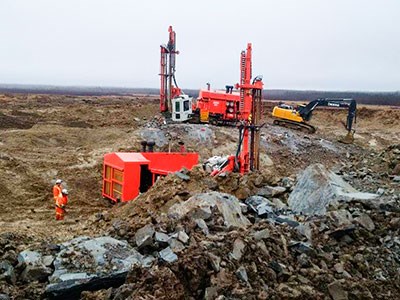A training agreement between an Aboriginal training centre in Kenora and an emerging northwestern Ontario gold miner is starting to pay dividends for area First Nations.
A first wave of 12 graduates from Seven Generations Education Institute’s surface miner training program were scheduled become permanent employees of New Gold at its advanced Rainy River project in early January.
The trainees, who arrived at the mine site located 65 kilometres northwest of Fort Frances last August, have had four months of hands-on experience in driving large Komatsu haul trucks and operating Sandvik DR580 production drills during the construction of the open-pit mine, which began last May near the town of Emo.
Sandvik and SMS Equipment, a heavy truck dealership in Winnipeg, are delivering the training and will supply the equipment for the construction and operation of the mine, scheduled to go into production in the summer of 2017.
Another wave of 35 participants will eventually be added to the growing workforce as part of a staggered intake between early January and late March.
“It is all dependent on the availability of equipment,” said Wayne Zimmer, Seven Generations’ director of apprenticeship, essential skills and post-secondary education. “New Gold is still assembling their fleet and once a piece of equipment is assembled, it goes into service, so there is a limit as to how many at one time.”
Zimmer said all the training was done in shifts so as to mirror work patterns at the future open-pit mine.
The Seven Generations graduates, who are embedded with some of the estimated 400 contractors on site, are currently building the ramps for the mine.
Eventually, they will work the production drills and drive haul trucks, loaders and scoops.
The mining company has committed to having 25 per cent of its labour from the surrounding First Nation communities.
Through impact benefit agreements, area First Nations have also secured service and supply contracts.
When processing plant operations begin, there will be a First Nations workforce component for that as well, said Zimmer.
The surface miner program is a collaboration of Seven Generations, the mining company, three area First Nations who signed participation agreements with New Gold — Big Grassy First Nation, Naicatchewenin First Nation, Rainy River First Nations — the Métis Nation of Ontario, and Shooniyaa Wa-Biitong, Treaty 3’s employment and training centre.
Zimmer said Seven Generations’ attachment to the gold project goes back to the Kenora-based institute’s previous dealings on possible training requirements with Rainy River Resources, an exploration junior miner that developed the project prior to its acquisition in 2013.
Prior to the start of training, prospective candidates for employment were screened and assessed for their aptitude on an equipment simulator before being sent through for interviews with the company.
Seven Generations and New Gold decided to formalize the training relationship in mid-December with the signing of a collaboration framework agreement.
Zimmer said they’re working closely with the mining company and Shooniyaa Wa-Biitona to assess workplace literacy essential skills, identify local skill gaps and occupational barriers for area First Nation members.




